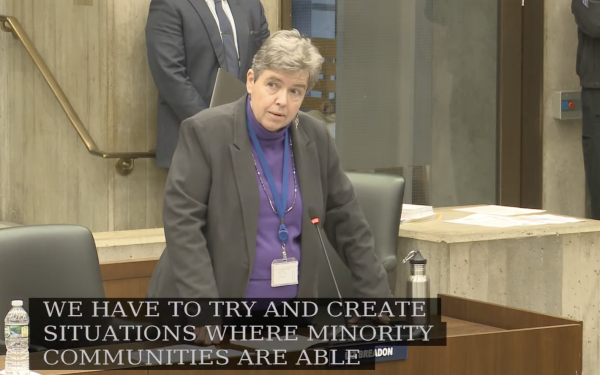November 2, 2022

Allston-Brighton Councillor Liz Breadon, chair of the City Council's redistricting committee. (Screenshot)
After weeks of acerbic arguments and backbiting over the city’s political boundaries, councillors voted 9 to 4 to send Mayor Wu a City Council map that reshapes districts anchored in Dorchester and South Boston.
Councillor Frank Baker’s Dorchester-based District 3 is set to shift north, deeper into South Boston, picking up public housing developments while losing the precincts along the Neponset River, including Ward 16 Precinct 11 and Ward 16 Precinct 12. District 4, a Dorchester-Mattapan seat held by freshman Councillor Brian Worrell, picks up the two precincts, which vote at Florian Hall.
The once-a-decade process, known as redistricting, is driven this year by a population boom in South Boston and a population loss in Dorchester. The nine Council districts should ideally have 75,000 residents each, but the process is complicated by the uneven size of precincts, which are the building blocks of redistricting.
Baker, who was first elected in 2011, has raged against the proposed changes, repeatedly berating Allston-Brighton Councillor Liz Breadon, the chair of the redistricting committee, at working sessions and hearings. He sought to keep all of Ward 16 in his district, as well as church parishes that serve Dorchester.
On Wednesday, before the vote on the final version of the map, Baker again took aim at Breadon. He had spoken to a Catholic priest earlier that morning, and the priest said the city’s clergy are “all talking about this process right here, they're viewing this exercise as an all-out assault on Catholic life in Boston,” said Baker, who was wearing a Celtic cross pin on his lapel. “And it's not lost on them that the person leading the charge on this is a Protestant from Fermanagh (Northern Ireland).”
The comment drew gasps from the crowd of onlookers assembled for the meeting and bewildered looks from Baker’s Council colleagues. After a brief recess, City Council President Ed Flynn said Baker broke Council rules with the verbal attack and the Dorchester councillor attempted to apologize while adding that his district’s Catholic neighborhoods are “under attack.”
Breadon, who immigrated to the U.S. from Northern Ireland in 1995 and later married a “nice Irish Catholic girl,” called Baker’s comment an “insult” and an “absolute disgrace.” She was born Protestant, but she was repulsed by the discrimination Catholics faced, Breadon said.
“I take it as a personal attack that anyone would doubt my sincerity and commitment to the process,” she said.
Councillors moved on to the matter at hand, a majority voting to turn back amendments and press on to the final map. The final vote on the map carries a veto-proof majority: Councillors Ricardo Arroyo, Kenzie Bok, Gabriela Coletta, Tania Fernandes Anderson, Kendra Lara, Ruthzee Louijeune, Julia Mejia joining Breadon and Worrell in voting “yes.” The “no” votes joining Baker and Flynn were Councillors Michael Flaherty and Erin Murphy.
In a statement, a spokesperson for Wu said the mayor is reviewing the approved map.
While the topic appears to be largely in the Council’s rear-view mirror for now, court battles are still likely, though the map’s supporters contend it will survive a legal challenge. On Wednesday, a Suffolk Superior Court judge turned down a request from Ward 6 Democratic Committee chairman Robert O’Shea for an injunction to block the Council from a vote.
Some South Boston and Dorchester civic groups had pressed for a delay and called for more public hearings while claiming councillors violated the Open Meeting Law at various gatherings held without sufficient public notice.
Flynn, the City Council president and South Boston’s District 2 councilor, earlier this week called for a “halt” to the process and said it was“tainted and flawed.”
Instead of a council vote, the redistricting effort should be handed off to a “blue-ribbon mapping commission” for study and to create maps that “will not tear neighborhoods apart,” he said.



